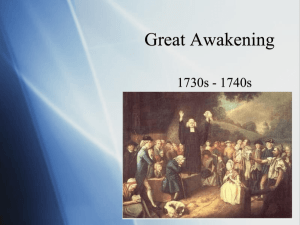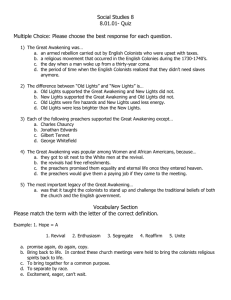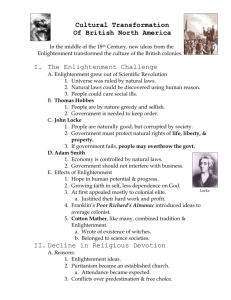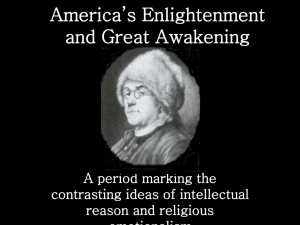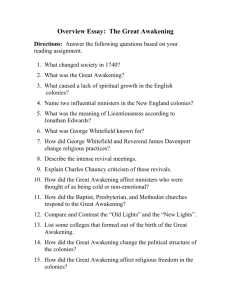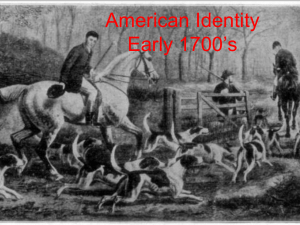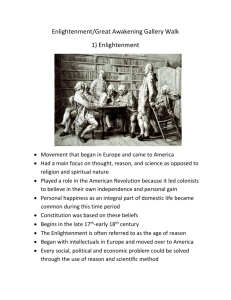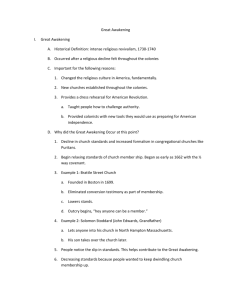- GlobalZona.com
advertisement
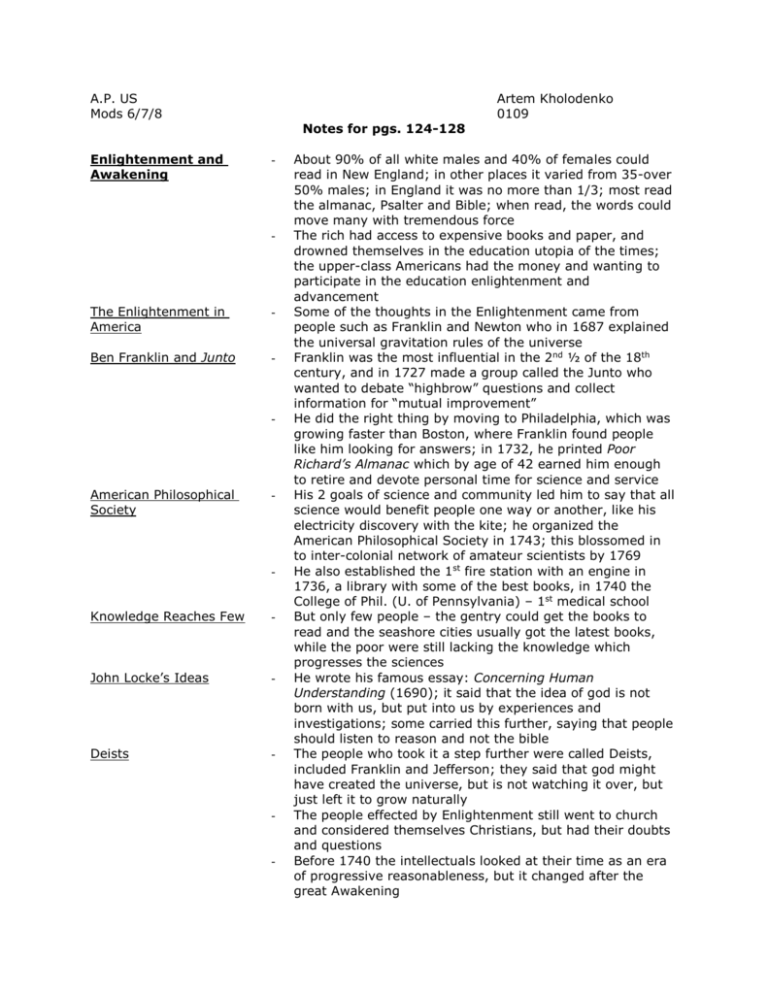
A.P. US Mods 6/7/8 Artem Kholodenko 0109 Notes for pgs. 124-128 Enlightenment and Awakening - - The Enlightenment in America - Ben Franklin and Junto - - American Philosophical Society - Knowledge Reaches Few - John Locke’s Ideas - Deists - - - About 90% of all white males and 40% of females could read in New England; in other places it varied from 35-over 50% males; in England it was no more than 1/3; most read the almanac, Psalter and Bible; when read, the words could move many with tremendous force The rich had access to expensive books and paper, and drowned themselves in the education utopia of the times; the upper-class Americans had the money and wanting to participate in the education enlightenment and advancement Some of the thoughts in the Enlightenment came from people such as Franklin and Newton who in 1687 explained the universal gravitation rules of the universe Franklin was the most influential in the 2nd ½ of the 18th century, and in 1727 made a group called the Junto who wanted to debate “highbrow” questions and collect information for “mutual improvement” He did the right thing by moving to Philadelphia, which was growing faster than Boston, where Franklin found people like him looking for answers; in 1732, he printed Poor Richard’s Almanac which by age of 42 earned him enough to retire and devote personal time for science and service His 2 goals of science and community led him to say that all science would benefit people one way or another, like his electricity discovery with the kite; he organized the American Philosophical Society in 1743; this blossomed in to inter-colonial network of amateur scientists by 1769 He also established the 1st fire station with an engine in 1736, a library with some of the best books, in 1740 the College of Phil. (U. of Pennsylvania) – 1st medical school But only few people – the gentry could get the books to read and the seashore cities usually got the latest books, while the poor were still lacking the knowledge which progresses the sciences He wrote his famous essay: Concerning Human Understanding (1690); it said that the idea of god is not born with us, but put into us by experiences and investigations; some carried this further, saying that people should listen to reason and not the bible The people who took it a step further were called Deists, included Franklin and Jefferson; they said that god might have created the universe, but is not watching it over, but just left it to grow naturally The people effected by Enlightenment still went to church and considered themselves Christians, but had their doubts and questions Before 1740 the intellectuals looked at their time as an era of progressive reasonableness, but it changed after the great Awakening The Great Awakening - Jonathan Edwards - George Whitefield - - - James Davenport - Old Lights Fire Back - New Lights Lose Control - Long Term Effects of the Awakening - The intellectuals thought they were pretty big – shots because the world was so predictable, but the epidemic of diphtheria in 1737 and 1738 which killed every 10th child under 16 moved people more into religion The revival of religion began to sweep the N.A. colonies, and even some of the elite became preachers It represented the unleashing of anxiety and longing among ordinary people living in an oral world and culture The preachers tried to intimidate the congregation with hell and other things alike, such as Edwards who led a revival in 1735 in Northampton, Massachusetts Even before, in New Jersey and New York, people tried to bring others together, such as Whitefield, who pieced it all together in 1739; he was an English clergy man, who stocked fires of revival in the Anglican church; he used powerful words and spoke very loudly He inspired many to join churches, and from the 630 joining churches in 1740, the # went to 3,217 in 1741, and every 5th man and woman under 45 was “born again: Whitefield even inspired Franklin, who was one the people who said they wouldn’t get involved; Whitefield went from town to town, and invited Gilbert Tennent to join him; Tennent build up a following, and so did another firebrand, James Davenport He preached for 24 hours non-stop in New York once Tennent and Davenport led a new group of New Lights, who diversified the religious groups in the colonies Old Lights didn’t like this Charles Chauncy said the revival was an epidemic The Awakening opened splits in American Protestants, and in 1741 the New & Old Light Presbyterians formed rival branches that didn’t unite until 1758; Anglicans lost many members to Presbyterians and Baptists, while the Congregationalists were doing so bad within 20 years of 1740, that the New Lights went down from being 1/3 of all churches and made other parishes In Massachusetts and Connecticut, the Old Lights denied legal status to N. Lights and forbade the revival churches; in Windham County, N. Lights were arrested for not paying tithes and Elisha Paine gave sermon from her cell after convicted for illegal preaching; N. Lights only got control of the assembly in Connecticut in 1759 The N. Lights made progress until 1770s, but the peak was in 1742, everywhere but in Virginia, where it was in 1755, with Baptist conversions, who had harassment 1st: lowered Quaker, Anglican, and Congregationalist power; the # of Presbyterian and Baptist churches increased after 1740 & Methodist after 1770; 2nd: new colleges were founded; Princeton in 1746; Columbia in 1754, Brown in 1764; Queen’s in 1766, and Dartmouth in 1769; 3rd: the blacks and Indians also began to participate and be effected, unlike before 1740; slaves were reached orally and by 1790 many blacks were Christians - Exception of various beliefs began to be accepted among people as well after the Awakening The revival has not been proven to have political effects, yet the generations of the revolution were effected by it
